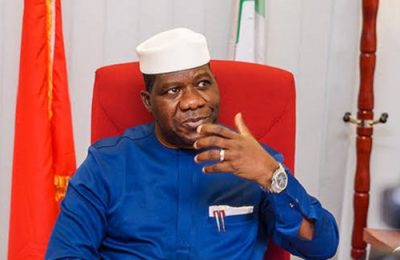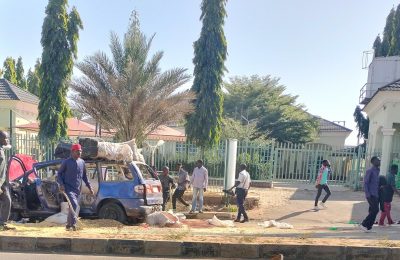
On Monday, December 19, 2022, I will be a guest of Osun State University, where I will deliver the Fourth Prince Tunde Ponnle Annual Lecture. The management of the University was careful to choose a subject dear to my heart: the funding of higher education in the context of global practices. I am very grateful to the Vice-Chancellor, Professor Clement Adebooye, who is doing well in advancing the University’s mission and vision. There is no doubt that Osun State University is set for greatness.
The history of higher education in Nigeria rode on the wings of high hopes and promises of improved workforce strength and overall national development. In 1932, Eric Hussey, a newly arrived educator in Nigeria’s Lagos City, proposed and lobbied for the establishment of Yaba Higher College, officially the first recognised higher institution in Nigeria. Although the college primarily offered vocational skills and was only for male students, and has now become defunct, it was the beginning of history

In 1947, following the Elliot Commission’s recommendations, plans began for the foundation of Nigeria’s first university. Within those plans was the proposal that the staff members and equipment at Yaba Higher College be transferred to Ibadan for the University College while a new Yaba Technical Institute (now Yaba College of Technology) be started in the place of the Higher College. Thus, Nigeria’s first formalized and certificate-awarding technical institute was founded in 1947, and a year later, the University College, Ibadan — now the University of Ibadan — was also established. With the founding of Nigeria’s first higher institutions, the cost of education for Nigerians became significantly lower than the cost of going abroad for further studies, for instance. Furthermore, it was a move in the right direction for a country clamouring for independence.
Over 70 years later, the sector that held so many promises is going to rack and ruin, with incessant strike actions, poor living conditions, underwhelming curriculums, and scores of graduates who can hardly hold their own compared to their counterparts in other countries, especially as it concerns research, technological advancement, discoveries, and research output. The few Nigerian students who make the country proud on the global stage do not and cannot attribute their successes to the Nigerian system. This is not to say that some institutions in the nation’s higher education system are not doing their best. For instance, the University of Ibadan has continually strived to emerge among Africa’s best ten universities.
However, as the Yoruba say, “obe to dun owo lo pa,” meaning that the mouth-watering soup has heavy financial investments that correspond with the level of its tastiness. In the same vein, running a higher institution of learning, especially a university, requires significant financial resources and investments, which higher institutions in Nigeria have not really enjoyed. The heights that the University has been able to attain both within the continent and globally are largely due to its administration, staff, and students, and it towers proportionally beyond the funds allocated to it or the financial aid it gets. To put this in context, in 1949, its second year of operation and with less than 200 students, the University of Ibadan received £200,000 in funding from the government, apart from donations from the Nuffield Foundation and the United African Company, among other corporate bodies and foundations that served as general donors to the institution. That allocated funding of £200,000 in 1949, if adjusted for inflation, would be £8. 35 million in 2022. If those figures are multiplied by Nigeria’s official rate of N533.50 to one pound sterling, then we would have N4.62 billion worth of government subvention and funding for the University College, Ibadan, in 1949.
Today, that same University has grown exponentially from three faculties and two halls of residence to 17 faculties and 92 departments. The increased number of faculties, departments, and halls of residence indicates an enormous increase in the number of staff members and students, which would have resulted in a tremendous increment in overhead costs, administrative costs, recurrent expenditure, and capital projects, coupled with the rising cost of things in Nigeria. The government subvention to the University of Ibadan has risen by 371%, from N4.62 billion in 1949 to N17.1 billion in 2022. This is seemingly the smallest percentage increase the University has seen, compared to the 600% increase in the number of residence halls, although a larger percentage of the approximately 30,000 students live off-campus. The student populace has also seen an almost 15,000% increase from about 200 in 1949 to almost 30,000 presently. These figures show that there has also been a corresponding growth in the management, administrative, academic, and non-academic staff.
This breakdown of the financial support the University of Ibadan has received and how it pales in comparison to its needs and current capacities serves as a poster analysis for other Nigerian higher education institutions that are heavily underfunded. Take the University of Hull, ranked between 501 and 600 according to the Times Higher Education 2022 ranking. The University of Hull has about 15,000 students — half the population of the University of Ibadan — had an annual income of £186.5 million or N103.2 billion in 2021, with an expenditure of £182.2 million or N100 billion in the same year. Even though the University of Hull is not one of the United Kingdom’s topmost or most-funded universities, its income is about one-third of the total allocation from the Nigerian federal government to 44 federal universities, and about one-eighth of the total budget for the Nigerian education sector, which includes pre-primary through post-secondary education.
Understandably, governments are not the only sponsors of universities and higher institutions of learning in other countries. There have also been arguments that countries are not created equal and that Nigeria’s economy does not compare in the least to that of countries like the United States and the United Kingdom, and that the cost of higher education in Nigeria is negligible compared to several universities abroad. Nonetheless, the gap between the figures is staggeringly shocking, especially as one starts to consider big-name universities in the Western and Eastern worlds. For instance, the annual budget of the University of Texas at Austin is $3 billion or N1 trillion, which is about one-sixth of the total budget of the Nigerian federal government for 2022, and the highest percentage of the income that the said University makes comes from state and county support, while it generates about $600 million annually for research and grants.
There can never be more than enough funding for higher institutions as they will always find use cases and needs for all funds received. When universities get sufficient funding for administrative, teaching, and research costs, they will be better positioned to make their mark globally while contributing to national growth and development through innovative research and discovery. Underfunding of Nigeria’s higher education institution goes much deeper than the comparisons made between the University of Ibadan and foreign universities, some of which it outperforms and outranks. When we beam the torchlight to state universities, state-run polytechnics, and colleges of education where the incumbent governor is nonchalant about the populace, owing salaries and leaving infrastructures in a dilapidated state, one would almost weep at the problems bedevilling our higher education sector.
A closer look at the underfunding problem in Nigeria’s higher education system shows some fundamental causes: the politicization of higher education in Nigeria, the overburdened nature of the federal government, and a lack of a properly implemented policy on education in the country. Nigeria is a country where the National Assembly, State Assemblies, and the executive council at both state and federal levels set up higher institutions to score political points or have a marked achievement during their tenure without proper consideration for the funding of such institutions and their place in the country’s overall education plan.
In 2011, the Goodluck Ebele Jonathan’s administration established nine new federal universities, a move that was political. Today, 11 years later, there are limited progress within those universities, with poor infrastructure, administrative fracas, and weak curriculums. In the same vein, the Oyo State Government has converted the Ladoke Akintola University of Technology from a technology-specific school to a conventional one, renaming it Ladoke Akintola University. While many state citizens have lauded this move, they do not know that the University, which has suffered tremendously, especially in the payment of staff salaries, is about to double or quadruple its staff strength and number of students. This increase will require more infrastructural constructions, hostels, and financial resources, which may not be allocated to measure up to the growth levels the institution needs. In the same Oyo State, the Emmanuel Alayande College of Education has been upgraded to a University of Education, an upgrade that will not necessarily translate to the full expansion of departments and faculties in the new University to what will compete favourably with its counterparts in other countries. Also, the new upgrades and changes may not see the light of maintenance and continuance after the tenure of the incumbent governor.
Furthermore, the Nigerian federal government is overburdened. Aside from fiscal expenditure, the federal government also allocates funds to states. Nigerian states are not financially autonomous. Some states have the bulk of their financial expectations on the federal government, and some of these states also own higher institutions. Expectedly, the higher institutions deliver underwhelming performances because there is no adequate funding or monitoring. Except for a few, Nigerian state-owned universities are under-funded, unlike state-owned technical institutes, colleges, and universities in other countries.
The biggest problem facing Nigeria’s higher education sector is the lack of a proper and well-planned national policy on education, and this has led to a do-as-you-wish approach to establishing and administrating institutions of higher learning in the country. There has to be a plan that takes into account the national goals for growth and development, the place of education in achieving those goals, the current realities of the Nigerian labour and workforce, the requirements per profession, national technological goals, and the demand for skilled labour. Based on these findings and needs, the country will then develop a policy on education that will inform the establishment and administration of institutions. Using this approach will help make more meaningful and impactful decisions, and the politically motivated establishment of higher institutions in the country will drastically reduce.
There have been several proposals and clamours for the autonomy of Nigerian universities. Some of the proponents have said that federal universities be allowed to charge tuition and other fees that would allow them to generate revenue that will significantly contribute to the running of the institutions. Many proponents, including the federal government, have called on higher institutions in the country to find a means of generating internal revenue. However, those who support the latter suggestion have failed to recognize that to generate internal revenue, the universities need businesses and investment portfolios, which require some degree of financial abundance to allow for investment and diversification. Or, how do you ask a university struggling with overhead and personnel costs to create businesses? Is money not needed to run businesses? Even if such a university continually pumps money into the business for two to three years, the profits may not even be significant enough to make the endeavour worth it.
Funding higher education institutions from internally generated revenues is a long-term goal that requires significant funding from the outset, patience, and no immediate expectations. Therefore, hammering on this as the solution to the underfunding problem in Nigerian higher education institutions is, in the short run, neither viable nor sustainable. Underfunding in Nigeria’s higher education institutions cripples innovation and development, hampers research and the motivation for it, and limits the heights higher education institutions can aim and attain. A university that struggles to pay its workers cannot favourably compete among the world’s top 100 universities. It is impossible. How many Nigerian universities have standard laboratories for research? These are the biggest problems facing the system.
Higher institutions are the breeding ground for innovation, discovery, and inventions worldwide. However, our schools in Nigeria do not produce as many patents as their counterparts in other countries because our researchers do not have enough funding to go to work. There are laments about various problems in the country; however, there is no major investment in our researchers and scientists to proffer solutions to these problems. It is important to consider how underfunding in Nigeria’s higher institutions flows down to several other sectors and affects the country. Underfunding leads to poor training of would-be teachers, who, when they become teachers, are half-baked and negatively impact those at the pre-primary to secondary stages of education, thereby causing an impending danger for the nation’s future.
The Education Task Fund is a government initiative in Nigeria that aims to contribute to infrastructural development and research. However, funding our higher education institutions must go beyond the existing scope. It is high time universities and other higher institutions went all out to attract external investors and stakeholders, corporate bodies, donors, individuals, and contributions from the alumni body. Many higher institutions of learning in Nigeria have a record-keeping problem, so much so that they hardly have access to their vast network of alumni bodies and are only at the mercy of those who remember to give back. Institutions should put processes in place that will allow them to connect with their alumni network.
Additionally, these institutions should have a value-based approach to their operations. Staff members and students must see and position themselves as problem-solvers. The beauty of this is that we are a country with many problems, so there is less chance of running out of ideas. As obtainable in other places, government bodies and corporate institutions can collaborate with higher institutions in Nigeria to solve some fundamental industry problems, with corporate institutions or government bodies providing the research funding for the bulk of the patent.
No matter how much we clamour and advocate for adequate funding of Nigerian higher institutions, if no mechanism is in place to curb excesses and track progress, funding will have no significant impact on national development. Therefore, as funds are being provided, there should be corresponding mechanisms to create an ecosystem that demands transparency and accountability, punishes defaulters, and rewards true champions of innovation and development within the walls of intellectual citadels.







